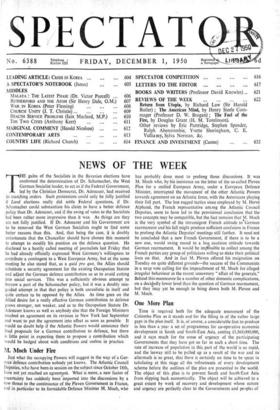M. Moch Under Fire
Just what the occupying Powers will suggest in the way of a Ger- man defence contribution nobody yet knows. The Atlantic Council Deputies, who have been in session on the subject since October 18th, have not yet reached an agreement. What is more, a new factor of uncertainty has suddenly been imported into the discussions by a new threat to the continuance of the Pleven Government in France, and in particular to its formidable Defence Minister M. Moch, who has probably done most to prolong those discussions. It was M. Moch who, by his insistence on the letter of the so-called Pleven Plan for a unified European Army, under a European Defence Minister, interrupted the movement of the other Atlantic Powers towards agreement on an Atlantic force, with the Americans playing their full part. The less rugged tactics since employed by M. Herve Alphand, the French representative among the Atlantic Council Deputies, seem to have led to the provisional conclusion that the two concepts may be compatible, but the fact remains that M. Moch is the very symbol of the intransigent French attitude to German rearmament and his fall might produce sufficient confusion in France to prolong the Atlantic Deputies' meetings still further. It need not be concluded that a new French Government, if there is to be a new one, would swing round to a lest cautious attitude towards German rearmament. It would be imOUssible to collect among the French parties any group of politicians willing to stake their political lives on that. And in fact M. Pleven offered his resignation on Tuesday on quite different grounds—the success of the Communists in a snap vote calling for the impeachment of M. Moch for alleged irregular behaviour in the recent unsavoury " affair of the generals." Behind this manoeuvre lie a number of other domestic complications, on a decidedly lower level than the question of German rearmament, but they may yet be enough to bring down both M. Pleven and M. Moch.






































